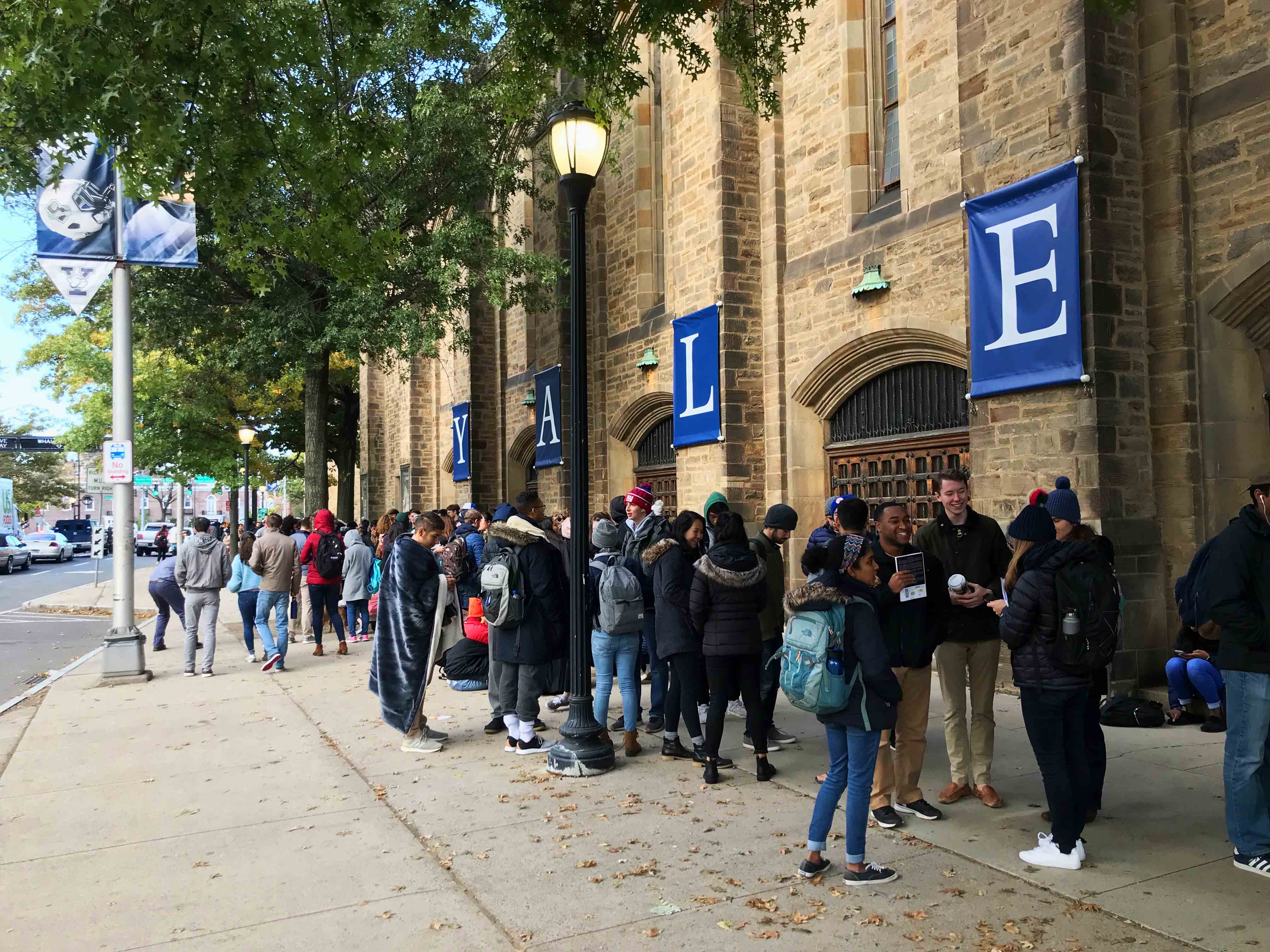
Ever wondered if there was any difference between Yale and Harvard? To find out, all you had to do was stand outside Payne Whitney Gymnasium last Thursday as tickets for The Game went on sale.
When I got in line to buy my ticket at 7:30 a.m., a full hour and a half before the ticket office opened, the line had already wrapped onto Dixwell Avenue. It stretched well onto Lake Place during the peak of the rush later in the morning. By 2 p.m., Yale Athletics had sold all 2,500 of its student tickets.
Some Yale students went to great lengths to avoid that line. Around 400 attended a slate of Yale games throughout the fall to qualify for access to Yale-Harvard tickets earlier in the week. Other students pitched a tent outside the ticket office early Thursday morning, ensuring their spots at the front of the line and turning Tower Parkway into a miniature version of Duke’s famed Krzyzewskiville.
Since The Game is the biggest event on both the Yale and Harvard athletic calendars, you might have expected a similar scene to have played out in Cambridge last month. But Harvard received substantially more student tickets from Fenway Park, eliminating the need for students to line up hours before the ticket office opened.
Still, the ticket process at Harvard resulted in controversy, as the economics concentrators of Cambridge quickly saw a chance to monetize their tickets. According to The Crimson, over one hundred students attempted to sell their tickets to The Game. The tickets have been scalped over email and on public Facebook pages for amounts ranging from $25 to over $200. Harvard’s ticket-scalping problem got so bad that two weeks ago, The Crimson reported that several residential deans chided students for abusing a free resource and threatened them with an appearance before Harvard’s disciplinary committee in a series of emails.
The contrast between the two fan bases is striking, and it speaks volumes about the sense of community at both schools. In New Haven, students spent three hours in line for a ticket that cost them $25. In Cambridge, Harvard could barely give tickets away — for free — without students running to the internet to scalp them.
A quick read through The Crimson in the last month reveals what Harvard students really think about community and football. As one said in an article about the scalping scandal, “The Game [is] the least fun part of the entire fiasco … I’d rather use that money to go to a restaurant or something of the like with my friends.”
To be fair to our friends in Cambridge, Harvard administrators bear some responsibility for the apathy towards The Game. While hosting The Game at Fenway will make for some great photos and lifelong memories for players, the distance from Harvard’s campus, limited room for tailgating and assigned-seat requirements make for a less fun game day experience for students. Harvard has not done much to mitigate students’ concerns. Harvard’s ticket website advertises free bus transportation to Fenway, but “additional information about logistics will be provided in November.” Administrators have told students there will be a FanZone near the ballpark, but again have fallen short on providing specifics.
However, none of those concerns dissuaded Yale students from waiting in a three-hour line for tickets. Yalies face significantly higher costs in going to The Game, having to pay $23 for a bus up to Cambridge and find somewhere to stay for the night. Still, they gobbled up every available ticket in less than five hours.
While I did not enjoy waiting in that three-hour line, it made me — a sentimental senior — appreciate all that The Game has to offer. It’s the one time of the year when our entire community comes together. I waited in line with fellow students whom I had never met. But I felt a connection with them that is rare at a place like Yale, where everyone does their own thing, constantly running at 100 mph.
As history professor Jay Gitlin ’71 MUS ’74 GRD ’02 once wrote in the News, “The Game is a grand excuse for the coming together of Bulldog Nation … [and] provides a spatial and temporal focus — never more important than now in an age of episodic socializing organized around cell phones.”
This is what the over 2,000 Yale students who waited in line last Thursday understand — and what the Harvard students who scalped their tickets do not.
Matthew Mister | matthew.mister@yale.edu .







